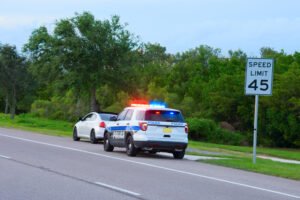
The moments following a collision are critical, teeming with adrenaline and split-second decisions. It’s a scenario that tests the mettle of even the most experienced drivers. Amidst this turmoil, one decision stands paramount: the choice to stay at the scene. In Florida, leaving the scene of an accident is not just a mistake; it’s a decision that can unleash a cascade of legal repercussions, turning a moment of panic into a lasting nightmare. The law is unflinching, and the consequences are severe. This article aims to underscore the gravity of such a choice, highlighting why, in the chaotic aftermath of an accident, remaining at the scene is the only decision that can steer you away from a path fraught with legal peril.
The Immediate Aftermath
The seconds following a traffic accident in Florida are often laced with chaos and disarray. Glass shards scattered across asphalt, the hiss of a damaged radiator, and the blaring of horns create a cacophony that can disorient even the most composed individuals. In this maelstrom, panic can cloud judgment, leading to decisions that have long-term consequences. However, it’s in these critical moments that staying calm and present at the scene is vital.
Fleeing the scene, a choice that might seem like an escape, only opens the door to a myriad of legal troubles. It’s not merely a breach of moral duty but a violation of state law. The importance of remaining at the scene cannot be overstated. It’s a time to assess the situation, check for injuries, and offer assistance. It’s also a legal necessity to exchange information and wait for law enforcement. This initial response not only speaks to your character but also lays the groundwork for any legal proceedings that may follow. In the disorienting aftermath of an accident, remember: your presence at the scene is the first step in navigating the situation lawfully and responsibly.

Legal Obligations in Florida
In the wake of a traffic accident in Florida, specific legal obligations are immediately set into motion, governing the actions of all involved parties. These laws, detailed in the Florida Statutes, are designed to ensure safety, accountability, and the swift resolution of any disputes or damages that may arise from the accident.
Firstly, the most fundamental obligation is to stop at the scene. Florida law mandates that any driver involved in an accident resulting in property damage, injury, or death must immediately halt their vehicle in a manner that does not obstruct traffic more than necessary. This is more than a courtesy; it’s a legal requirement, and failure to comply can result in severe criminal charges.
Once stopped, the driver is required to provide reasonable assistance to anyone injured in the accident. This duty extends beyond mere moral obligation; it is a legal necessity. If an individual is injured, drivers must ensure that medical assistance is called for or provided, and they must remain at the scene until help arrives. This requirement underscores the state’s commitment to the welfare of its citizens in times of crisis.
In addition to providing aid, drivers must exchange pertinent information with other parties involved in the accident. This includes names, addresses, and vehicle registration numbers. If requested, drivers are also obligated to present their driver’s licenses. In accidents involving unattended property or vehicles, drivers must leave their contact information in a secure and visible place.
For accidents resulting in significant property damage, injuries, or fatalities, there is a legal requirement to report the incident to the nearest law enforcement agency. This could be the local police, the county sheriff, or the Florida Highway Patrol. The report should be made as soon as possible after the accident, providing a factual account of what occurred.
These legal obligations serve a dual purpose: they provide immediate assistance and information exchange at the accident scene and lay the groundwork for any subsequent legal or insurance processes. Adhering to these laws not only helps to mitigate the immediate aftermath of an accident but also protects individuals from the legal ramifications of non-compliance.
 We’re here to serve you. Our phones are open 24 hours a day.
We’re here to serve you. Our phones are open 24 hours a day.
The Dire Consequences of Fleeing
The decision to leave the scene of a traffic accident in Florida is not just a momentary lapse in judgment; it is a legal transgression that can trigger a domino effect of severe penalties. Florida’s legal system is particularly stringent when it comes to hit-and-run offenses, with repercussions ranging from heavy fines and jail time to felony charges, depending on the gravity of the incident.
For accidents involving only property damage, fleeing can still lead to substantial consequences. If convicted, the individual faces a second-degree misdemeanor, which could result in a fine of up to $500 and up to 60 days in jail. However, the severity escalates dramatically if the accident involves injuries. In such cases, the offense is elevated to a third-degree felony, carrying penalties including up to 5 years in prison or 5 years of probation, and a $5,000 fine. This level of punishment reflects the seriousness with which Florida law views the abandonment of injured parties at an accident scene.
The most severe penalties are reserved for hit-and-run accidents resulting in fatalities. Classified as a first-degree felony, the perpetrator, if convicted, faces a minimum mandatory sentence of 4 years, and up to 30 years in prison, along with a $10,000 fine. Additionally, the individual’s driver’s license can be revoked for at least three years, a penalty that underscores the state’s intention to keep irresponsible drivers off the road.
These legal repercussions are not mere threats; they are actively enforced, as numerous real-life cases demonstrate. For instance, consider the case of a Florida driver who, in a panic, fled an accident scene where a pedestrian was seriously injured. The driver was later apprehended and sentenced to several years in prison, facing not only the loss of freedom but also the enduring burden of a felony record. In another case, a driver involved in a fatal hit-and-run was sentenced to a lengthy prison term, with the judge emphasizing the irreparable harm caused to the victim’s family and the broader community.
These examples are not isolated incidents but part of a pattern of strict enforcement intended to deter drivers from making a catastrophic decision to flee. The message from Florida’s legal system is clear and unambiguous: leaving the scene of an accident will not mitigate your troubles; it will exponentially compound them. The consequences extend beyond legal penalties; they can include personal and professional ruin, irreversible damage to one’s reputation, and the enduring guilt and emotional turmoil of having caused harm through a reckless and irresponsible choice. The law, in its unyielding severity, seeks to remind every driver on Florida’s roads that the aftermath of an accident is not just a test of legal compliance but a measure of moral responsibility.
 We’re Florida’s top litigation team with over 75 years of combined experience
We’re Florida’s top litigation team with over 75 years of combined experience
Why Contacting an Attorney First Matters
In the unsettling aftermath of leaving the scene of an accident in Florida, the instinctive reaction might be to turn immediately to law enforcement to report or explain the situation. However, this step, taken without prior legal counsel, can inadvertently escalate the complexity of your legal predicament. Consulting an attorney first is not an act of evasion but a crucial step in ensuring your rights are protected and your side of the story is properly framed within the legal context.
Attorneys with experience in traffic and criminal law possess a deep understanding of the nuances of such cases. They can offer invaluable guidance on the best course of action, considering the specific circumstances of the incident. An experienced lawyer can help articulate your situation in a manner that legally explains your actions, potentially mitigating the severity of the charges.
Legal counsel becomes even more critical if you have left the scene of an accident. In such scenarios, every word and action can have significant legal implications. An attorney can advise you on how to engage with law enforcement and what information to disclose. This guidance is crucial to avoid unintentionally incriminating yourself or exacerbating the situation.
 From the initial call to updates on your case status, we are here to get you answers.
From the initial call to updates on your case status, we are here to get you answers.
The Role of Legal Representation
Once you’ve engaged a lawyer, they become your advocate, navigating the complexities of the legal system on your behalf. An experienced attorney can negotiate with law enforcement and the prosecution, working to reach an outcome that minimizes the potential penalties. In some cases, this might involve plea bargaining or presenting mitigating factors that could lead to reduced charges or alternative sentencing.
A key aspect of the attorney-client relationship is the privilege it entails. This confidentiality ensures that anything you discuss with your lawyer remains private, allowing for open and honest communication. This candidness is vital for your attorney to fully understand your situation and provide effective representation. It’s important to remember that this privilege exists to protect your rights and to foster a transparent and trusting relationship with your legal counsel.
Your lawyer’s role extends beyond the courtroom. They offer support and advice through every step of the legal process, from initial consultations to court appearances and beyond. In a situation as fraught as leaving the scene of an accident, having a skilled attorney can make a significant difference in the outcome and in navigating the legal ramifications with a more informed, strategic approach.
The Long-Term Impact
A hit-and-run conviction in Florida carries long-term repercussions that extend far beyond the immediate legal penalties. A criminal record resulting from such a conviction can have far-reaching effects on your life. It may hinder employment opportunities, as many employers are hesitant to hire individuals with a felony record. Insurance complications are another consequence, with significant increases in premiums or even the possibility of policy cancellation. Moreover, the social stigma and damage to personal reputation are profound; being labeled as someone who fled the scene of an accident can lead to lasting distrust and judgment in both personal and professional circles.
Avoiding the Worst – Steps to Take at an Accident Scene
To avoid legal trouble following an accident, immediately stop your vehicle in a safe place. Check for any injuries and call emergency services if necessary. Exchange information with the other party, including names, contact details, insurance information, and vehicle registration numbers. Take photos of the scene and any damage to the vehicles. Do not admit fault or make speculative statements. Finally, report the accident to the police, especially if there are injuries or significant property damage.
FAQ Section
What should I do if I am involved in a car accident in Florida?
If you are involved in a car accident, Florida law requires you to immediately stop at the scene of the accident, regardless of whether it involves serious bodily injury, property damage, or both. You must provide reasonable assistance to anyone injured and exchange information with the other parties involved.
What are the penalties for a hit and run in Florida?
The penalties for a hit and run vary based on the severity of the accident. Leaving the scene of an accident involving only property damage is a second-degree misdemeanor. If the accident involves bodily injury, it becomes a third-degree felony. In cases of serious injury or death, it escalates to a first-degree felony, with penalties including a mandatory minimum sentence and potential license suspension.
What if the accident involved property damage to an unattended vehicle or property?
If the crash involved property damage to an unattended vehicle or property, you must leave your contact information for the property owner and report the incident to the nearest law enforcement agency. This could be a written notice securely attached to the property or vehicle.
Is it necessary to contact my insurance company after an accident?
Yes, it’s important to contact your insurance company after an accident. Providing them with the details of the incident, including the vehicle registration number of the other car, can help in processing your claim.
What are the consequences if the hit and run accident led to a victim’s death?
If a hit and run accident results in a victim’s death, it is considered a first-degree felony under Florida law. The offending driver faces serious consequences, including up to 30 years in prison, a significant fine, and a mandatory minimum sentence.
Can my driver’s license be suspended for a hit and run?
Yes, if you are convicted of a hit and run, especially in cases where the crash involved property damage or injuries, you may face driver’s license suspension for a significant period.
What should I do if I accidentally caused property damage in a parking lot and the other driver wasn’t present?
In such a scenario, Florida statutes require you to leave identifying information in a conspicuous place on the damaged vehicle or property and report the accident to the nearest law enforcement agency. Failure to do so can be considered a hit and run.
Contact The Law Place Today!
In the chaotic aftermath of a traffic accident in Florida, understanding the critical importance of remaining at the scene is essential. The decision to stay and fulfill your legal obligations can significantly impact the legal outcome of the incident. If you find yourself in such a situation, seeking legal counsel is paramount.
At The Law Place, we can help you navigate the complexities of traffic accident cases. Our experienced attorneys are committed to protecting your rights and guiding you through the legal process with compassion. Contact us today to ensure you have knowledgeable representation that can make a decisive difference in your case.





